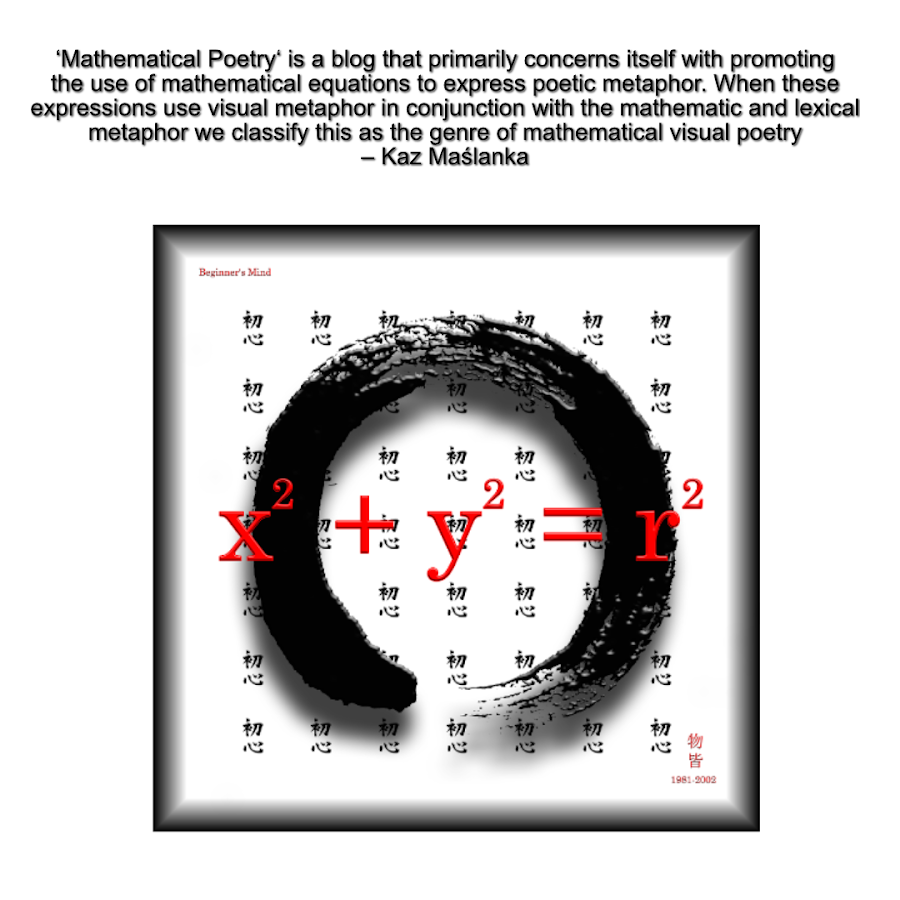
The Mathematician, Professor Ray Balbes will prove to you that “No Cat Is The God Of Itself”.
At the end of my blog entry for Axiomatic poems dated
Kaz
The Professor Ray Balbes wrote the following text:
For reference, here is what we have so far.
The Peano Axioms
- One is a number
- If x is a number, the successor of x is also a number.
- One is not the successor of any number.
- If two numbers have equal successors, they are equal.
- If a set of numbers contains the number one and it contains all the successors of its members then the set contains all the numbers.
Let us replace “number” with “cat” and let us also replace “successor” with “God”. Lastly, I am going to replace “One” with “Abraham”.
The Poetic Peano Axioms
- Abraham is a cat
- If x is a cat, the God of x is also a cat.
- Abraham is not the God of any cat.
- If two cats have equal Gods, they are equal.
- If a set of cats contains the cat Abraham and it contains all the Gods of its members then the set contains all the cats.
OK, now to make the theorems more succinct, lets set up some conventions. With regard to the Peano Axioms, let us call the set of all numbers N and let us denote by n’, the successor of n
Also let:
11 = 1’
12 = 1’’
13 = 1’’’
etc.
We will refer to 1’ by the name of 2, 2’ will be called 3, etc.
Axiom 3 says that there is no n such that n’=1.
Axiom 4 says that if m’ = n’ then m=n.
Axiom 5 says that if S is a non-empty subset of N with these 2 properties:
i) 1 is in S
ii) If n is in S then n' is in S.
Then S = N.
Here are three theorems that lead up to the Well Ordering Principle. First, I will state them in terms of the Peano Axioms, next in terms of the Poetic Peano Axioms and finally I will prove something.
Theorem 1. For every n in N, n’≠n.
Theorem 2. If n ≠ 1 then n=m’ for some m.
We will say that m ≤ n provided that m = n or mp = n, for some p
Theorem 3. For every n in N, 1 ≤ n
Theorem 4 (The Well Ordering Principle) If S is any non empty subset of N then there is a number m in S such that m ≤ n for all n in S.
Here are the theorems in terms of the Poetic Peano Axioms. We will say that m is the source of n provided that m ≤ n. In other words, a finite number of Gods of m, yields n.
Theorem 1 No cat is the God of itself.
Theorem 2. Every cat, other than Abraham is the God of some other cat.
Theorem 3. Every cat has Abraham as a source.
Theorem 4 (The Well Ordering Principle) In any (non-empty) set of cats, there is one that is the source of all the others.
Here is the proof of Theorem 1 in terms of the Peano Axioms
Let S = {n| n’ ≠ n}. We will show that S satisfies the conditions i) and ii) of Axiom 5. By Axiom 3, 1 is in S so i) is true. To prove ii), suppose that n is in S then n’≠n. But if n’’=n’ then, by Axiom 4, we would have n’=n, a contradiction, so n’’<>n’. Hence n’ is in S. This means that S satisfies the conditions of Axion 5 and therefore S= N. So that n’<>n for all n in N.
Here’s the proof of Theorem 1 in terms of the Poetic Peano Axioms. Note that in the proof, I am referring to the Poetic Peano Axioms, not the Peano Axioms.
Consider the set S of all cats that are not Gods of themselves. We will show that S satisfies the conditions i) and ii) of Axiom 5. By axiom 3, Abraham is a member of S so i) is true. To prove ii), suppose that Isaac is a cat in S then Isaac is not the God of Isaac. Suppose the God of Isaac is Moishe. Now if the God of Moishe is Moishe then by Axiom 4, Moishe would be Isaac; that is the God of Isaac would be Isaac, a contradiction. Hence Moishe is in S. Since Moishe is the God of Isaac, we have shown that the God of Isaac is in S; in other words, the condition ii) of Axiom 5 is satisfied and thus S is the set of all cats. This means that all cats satisfy the property that they are not Gods of themselves.
The proofs of the other theorems are similar to this.
Ray

Abraham, cats, gods.
ReplyDeleteOne, numbers, successors.
Which is really more poetic?
Hi JD,
ReplyDeleteThis is such an excellent question that I am going to devote an upcoming blog entry to it. THANK YOU and stay tuned.
Kaz